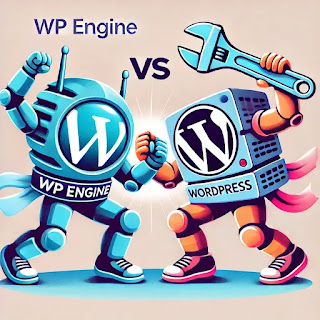The Ban
In a significant move that sent shockwaves through the WordPress community, WordPress founder Matt Mullenweg announced the banning of WP Engine, a popular managed WordPress hosting provider. This decision, made public in Sept 2024, was a culmination of growing tensions between WordPress and WP Engine over several key issues.
Reasons Behind the Ban
- Profiting without Contributing: One of the primary reasons cited by Mullenweg was WP Engine's perceived failure to contribute significantly to the development and maintenance of WordPress. While WP Engine had built a successful business on top of the open-source platform, Mullenweg argued that the company was not giving back to the community in a meaningful way.
- Restricting Core Functionality: WP Engine had been accused of limiting certain core features of WordPress, such as post revisions. This practice was seen as anti-user, as it prevented WordPress users from having full control over their content.
- Community Backlash: The decision to ban WP Engine was supported by many members of the WordPress community. They felt that WP Engine's practices were detrimental to the platform's principles and that the ban was a necessary step to protect the integrity of WordPress.
Impact on Users
The ban had significant implications for WP Engine's users. Many were concerned about the potential disruption to their websites and the uncertainty surrounding their hosting provider's future. While WP Engine reassured its customers that they would continue to provide support and services, the ban raised questions about the long-term viability of the company.
Some users expressed frustration with the situation, arguing that they had chosen WP Engine for its convenience and reliability. Others, however, supported the ban, believing that it was a necessary step to hold WP Engine accountable for its actions.
The Broader Implications
The WP Engine ban has sparked important discussions about the relationship between open-source software and commercial entities. It has raised questions about the responsibilities of companies that profit from open-source platforms and the importance of contributing back to the community.
The ban has also highlighted the power dynamics within the WordPress ecosystem. While WordPress is a free and open-source platform, it has become a critical tool for millions of businesses and individuals. The ban serves as a reminder that even the most popular and successful open-source projects are not immune to controversy and conflict.
Alternatives to WP Engine Following the Ban
Following the ban on WP Engine by WordPress, many users were left searching for suitable alternatives. Here are some popular options that emerged as viable replacements:
Managed WordPress Hosting Providers
- Kinsta: Known for its speed and performance, Kinsta offers a managed WordPress hosting platform with a focus on scalability and security.
- Flywheel: This provider emphasizes design and development, catering to agencies and freelancers with features like local development environments and team collaboration tools.
- Bluehost: A popular choice for many, Bluehost offers managed WordPress hosting plans with a variety of features and pricing options.
- SiteGround: Known for its excellent customer support, SiteGround provides managed WordPress hosting with a focus on speed and security.
Self-Hosted WordPress Solutions
- DigitalOcean: A cloud infrastructure provider that allows users to set up and manage their own WordPress instances.
- Linode: Similar to DigitalOcean, Linode offers virtual private servers (VPS) for those who prefer to have more control over their hosting environment.
- Vultr: Another VPS provider with a focus on flexibility and performance.
Hybrid Solutions
- Pressable: A managed WordPress hosting provider that also offers dedicated servers and custom hosting solutions.
- Cloudways: A managed cloud platform that supports various applications, including WordPress, with a focus on scalability and performance.
Factors to Consider When Choosing an Alternative
When selecting a WP Engine alternative, consider the following factors:
- Features: Does the provider offer the features you need, such as automatic backups, security updates, and performance optimization?
- Performance: How fast are the provider's servers and how well do they handle traffic spikes?
- Cost: What is the pricing structure and are there any hidden fees?
- Customer support: How responsive and helpful is the provider's customer support team?
- Scalability: Can the provider accommodate your website's growth and increased traffic?
By carefully evaluating these factors, you can find a WP Engine alternative that meets your specific needs and provides a reliable hosting solution for your WordPress website.
Conclusion
The WP Engine ban was a significant event in the history of WordPress. While the decision was controversial, it has had a lasting impact on the WordPress community and the broader conversation about open-source software and commercialization. The ban has forced companies to re-examine their relationship with open-source platforms and to consider the importance of contributing back to the communities that support them.






0 comments:
Post a Comment